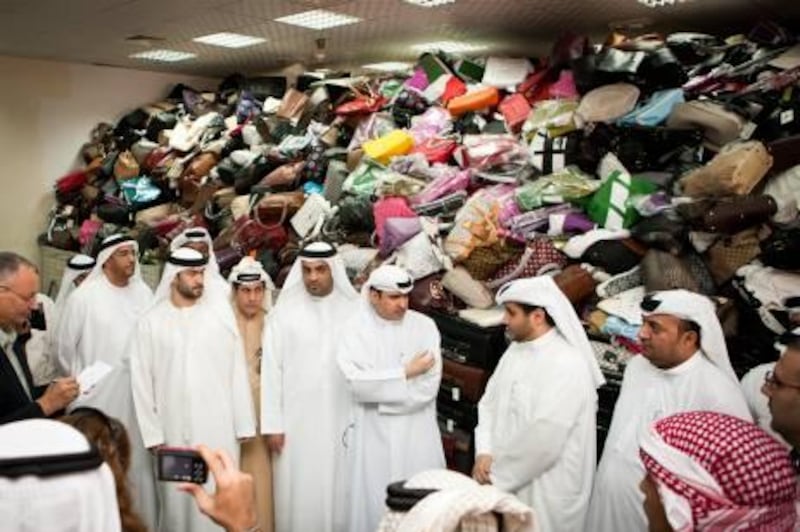DUBAI // Behind the doors of a quiet government warehouse lay an Aladdin’s cave of almost a half-million goods – from “Suny Eriksson” mobile phones to “Louisa Vuitton” handbags.
But the items in this treasure trove would not find their way into anyone’s hands.
They were all destroyed yesterday by the Department of Economic Development (DED) during a blitz on counterfeit goods.
_______________
More
• Video: Dubai government reveals counterfeit haul
_______________
Fake Pfizer-branded Viagra pills, perfumes, cosmetics and “iPods” were among the 453,000 items that met their demise in a large shredder in the back of a van, or at the bottom of a landfill.
More unusual goods, such as spears, fluorescent light tubes and football kit were also destroyed.
The DED confiscated the items during random inspections throughout the past year at souqs in Bur Dubai and Karama, as well as in nearby warehouses.
More than 1,300 fines were issued in connection with the property seizures.
The number of arrests made as part of the campaign to protect intellectual property rights was not revealed. The offence is punishable by a fine of up to Dh50,000 for sellers of the goods, and closure of the business for up to 90 days.
The measure is part of the DED’s efforts to strengthen consumer confidence in the quality of merchandise.
Officials said they hoped to show “how bad these practices are for our market, and how risky some of these products really are,” said Sami Dhaen al Qamzi, the director general of the DED.
Traders in counterfeit goods seem to target tourists, who are less likely to determine the retail value of the items. Price was the best way to determine real from fake, according to Mr al Qamzi. Some items come with certificates that can be traced back to the company that made them.
“But, really, people who buy [the real versions] know the difference between fake and original,” he said.
The UAE was once considered an easy destination for fencing fake goods. However, the Heritage Foundation, a conservative think-tank, said in its 2011 index of economic freedom that the country leads the region in protecting intellectual property rights.
Officials say they have increased their enforcement against counterfeit operators. The number of counterfeit items seized last year was nearly double the 250,000 that were confiscated in 2009.
And efforts to collaborate with trademark companies may be part of why the UAE has earned such high marks.
Experts at trademark companies, including Apple, work with the DED to help determine where any abnormalities may be found on genuine-looking devices.
“We work with experts in this field, from the trademarks, who know where to find the differences,” said Omar Bushahab, the chief operating officer of the commercial compliance and consumer protection division of the DED.
Any cosmetic or toiletry suspected of being fake has its ingredients analysed at a DED lab. The danger is two-fold, according to Mohammed Lootah, the deputy chief executive of the commercial complaints and consumer protection sector of the DED.
“Shampoo and lotions might affect the health of the consumer,” he said, adding: “If we don’t protect trademark owners it will affect the economy.”
How much the market impacts the economy remains unclear. The DED has no figures on the amount of counterfeit goods in the UAE, or how much profit the items represent. The department says it is unsure how the goods enter the country, or from where.
“We have a lot of entrances to this country, so we don’t know where it’s coming from, all we know is it is available on the market,” said Mr al Qamzi, adding that the Government will begin gathering statistics on these questions.
The DED plans to double counterfeiting fines and work more closely with regional directors of trademark companies.
Companies should appoint representatives who could watch for areas where fake goods were sold, officials said. Traders are urged to register their trademarks to protect them from other companies.
The aim is to reduce the number of fake items that can be found in shops.
Recycling the items or donating them to charity can be difficult under the law. To do so, any traces of the trademark must first be erased, according to Mr Lootah.
"Most of the time, it's impossible to do that, so that's why we'd rather destroy them," he said.
mdetrie@thenational.ae






